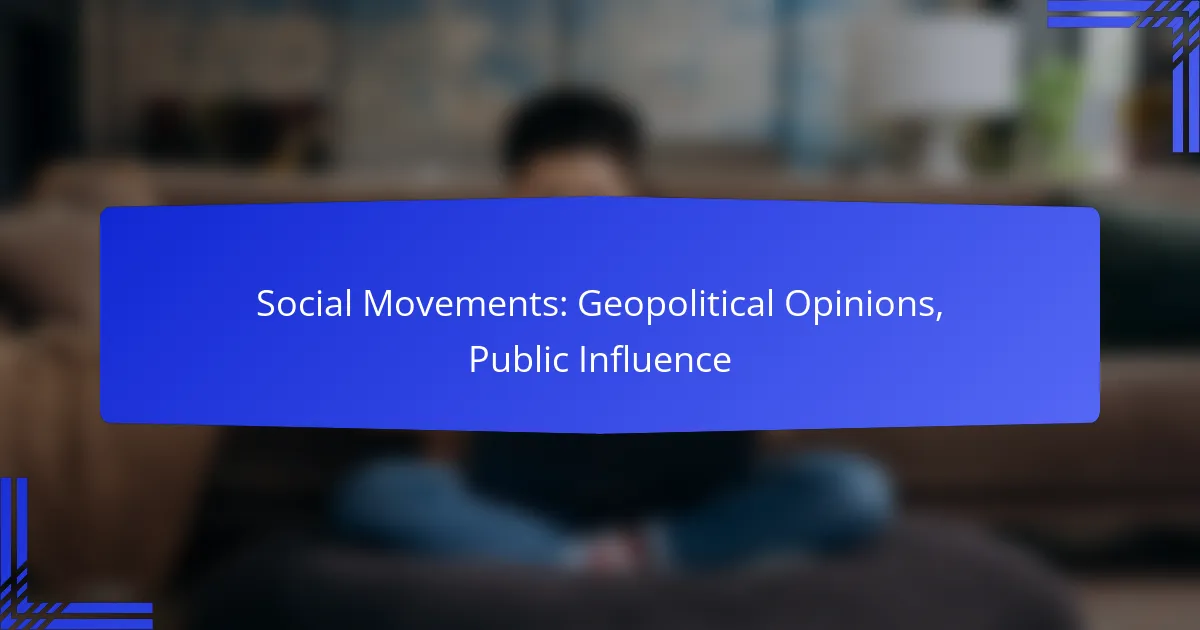Social movements play a crucial role in shaping geopolitical opinions by harnessing public sentiment and influencing policymakers. Through organized collective action, these movements advocate for various social issues, such as racial equality and environmental justice, ultimately driving significant changes in public discourse and international relations.
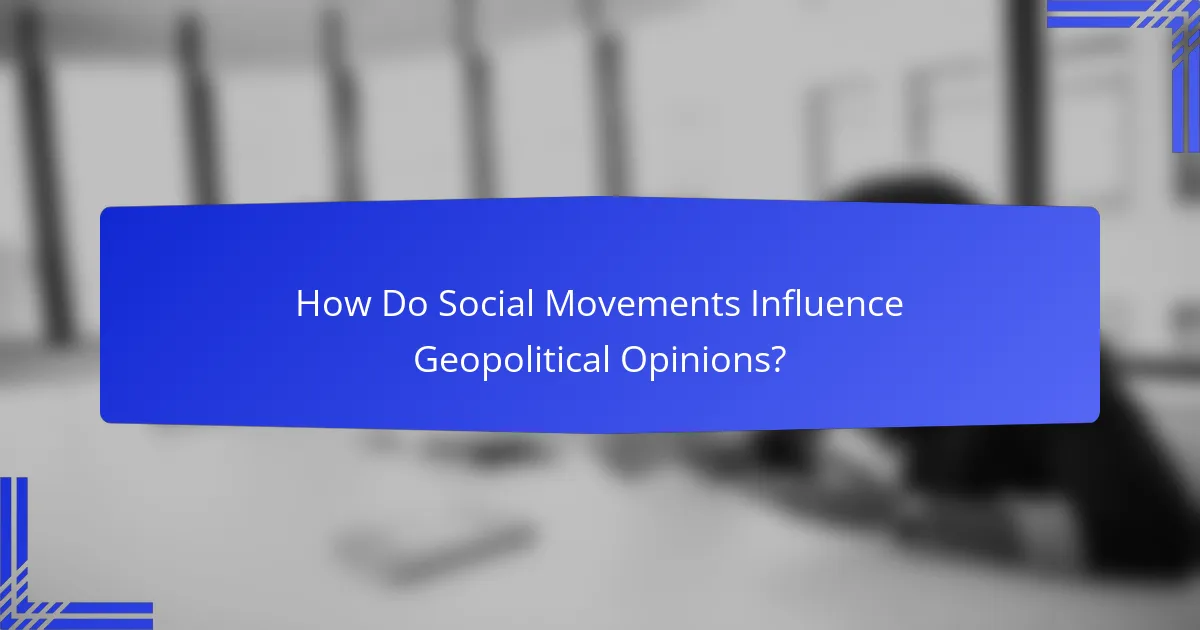
How Do Social Movements Influence Geopolitical Opinions?
Social movements significantly shape geopolitical opinions by mobilizing public sentiment and pressuring decision-makers. They can drive policy changes, alter public discourse, and affect international relations through collective action and advocacy.
Direct impact on policy changes
Social movements can lead to concrete policy changes by advocating for specific issues, such as climate action or human rights. For instance, movements like Black Lives Matter have prompted legislative reviews and reforms in policing practices across various states in the U.S.
These movements often utilize petitions, protests, and lobbying to influence lawmakers. When public support is evident, policymakers may feel compelled to respond to the demands of these movements, resulting in new laws or amendments to existing regulations.
Shaping public discourse
Social movements play a crucial role in shaping public discourse by bringing attention to specific issues and framing them in a way that resonates with the public. They often use social media platforms to amplify their messages and engage a broader audience.
For example, the #MeToo movement has transformed conversations around sexual harassment and assault, making these topics more visible and prompting a cultural shift in how society addresses these issues. This shift can lead to increased awareness and support for related policies.
Mobilizing grassroots activism
Grassroots activism is a hallmark of social movements, empowering individuals to take action within their communities. This can include organizing local events, rallies, and educational workshops to raise awareness and foster engagement.
Effective grassroots movements often rely on building coalitions with other organizations to amplify their reach. By mobilizing community members, these movements can create a strong network of advocates who push for change at local, national, and international levels.
Influencing international relations
Social movements can influence international relations by drawing attention to global issues and advocating for changes in foreign policy. Movements focused on human rights, environmental protection, or anti-war sentiments can pressure governments to reconsider their international stances.
For instance, climate movements have led to international agreements like the Paris Accord, as public pressure from these movements encourages countries to commit to reducing carbon emissions. This demonstrates how grassroots activism can have far-reaching implications beyond national borders.

What Are Key Examples of Social Movements?
Social movements are organized efforts by groups of people to promote or resist change in society. Key examples include movements that address racial equality, gender rights, environmental issues, and public demonstrations for social justice.
Black Lives Matter
The Black Lives Matter (BLM) movement emerged in response to systemic racism and police violence against Black individuals. Founded in 2013, it seeks to raise awareness and advocate for policy changes that promote racial equality and justice.
BLM has organized numerous protests and campaigns, utilizing social media to mobilize supporters and spread its message globally. The movement emphasizes the importance of community engagement and policy reform to address racial disparities.
#MeToo Movement
The #MeToo movement began in 2006 but gained widespread attention in 2017 as a response to sexual harassment and assault, particularly in the workplace. It encourages survivors to share their experiences and seeks to hold perpetrators accountable.
This movement has led to significant discussions about consent, workplace culture, and the need for stronger protections against harassment. Organizations are increasingly implementing policies to create safer environments for all employees.
Climate Strikes
Climate strikes are organized protests aimed at demanding action on climate change, primarily led by youth activists. Initiated by Greta Thunberg in 2018, these strikes have mobilized millions worldwide to advocate for urgent environmental policies.
Participants often call for government accountability and the implementation of sustainable practices. The movement highlights the need for immediate action to mitigate climate change effects, urging individuals and institutions to reduce carbon footprints.
Women’s March
The Women’s March began in 2017 as a response to concerns about women’s rights and social justice issues. It emphasizes equality, reproductive rights, and protection against discrimination and violence.
Annual marches and events have drawn large crowds, demonstrating solidarity and advocating for legislative changes. The movement encourages grassroots activism and community involvement to promote gender equity across various sectors.
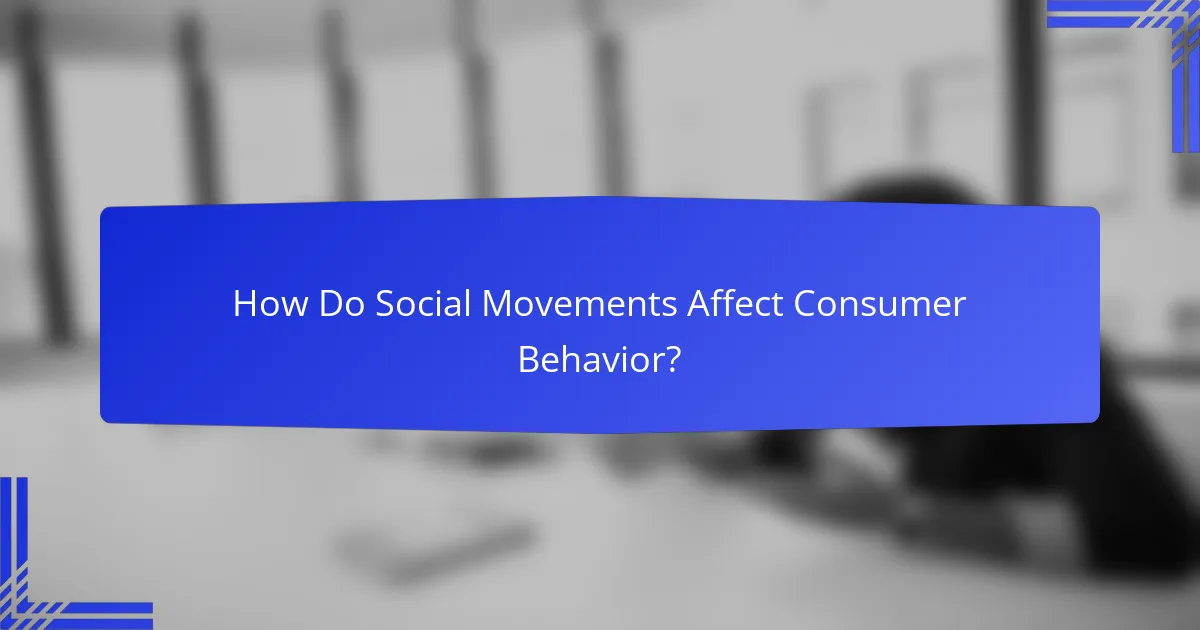
How Do Social Movements Affect Consumer Behavior?
Social movements significantly influence consumer behavior by shifting preferences, altering brand perceptions, and promoting ethical consumption. These changes often lead to increased demand for products that align with the values and beliefs championed by these movements.
Shifting brand loyalty
Social movements can lead consumers to reassess their loyalty to brands based on the companies’ stances or actions related to social issues. For example, brands that actively support environmental sustainability may attract consumers who prioritize eco-friendly practices, while those that remain neutral may lose market share.
As a result, businesses must be aware of public sentiment and adapt their marketing strategies accordingly. Engaging in transparent communication and aligning with social causes can foster stronger brand loyalty among target demographics.
Driving ethical consumption
Consumers are increasingly motivated to make purchases that reflect their ethical beliefs, often driven by social movements advocating for social justice, environmental protection, and fair trade. This shift encourages brands to adopt sustainable practices and promote ethical sourcing to meet consumer expectations.
For instance, the rise of veganism and cruelty-free products has prompted many companies to reformulate their offerings. Brands that fail to adapt may find themselves at a competitive disadvantage as consumers seek out alternatives that align with their values.
Influencing product development
Social movements can directly impact product development by pushing companies to innovate in response to consumer demands for socially responsible products. This may include developing eco-friendly packaging, cruelty-free cosmetics, or fair trade goods.
Companies that actively incorporate feedback from social movements into their product lines can enhance their market relevance. Engaging with consumers through surveys or social media can provide valuable insights into what features or values are most important to them, guiding future product strategies.
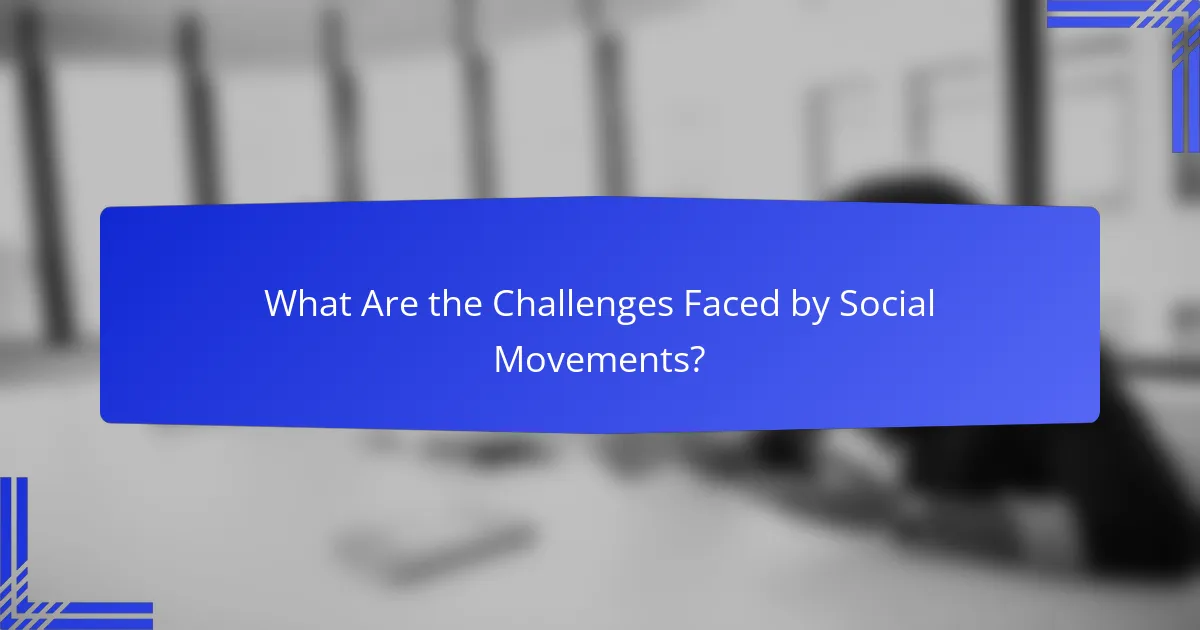
What Are the Challenges Faced by Social Movements?
Social movements encounter several significant challenges that can hinder their effectiveness and sustainability. Key issues include internal divisions, media representation problems, and government pushback, each of which can undermine the movement’s goals and public perception.
Internal divisions
Internal divisions within social movements can arise from differing ideologies, strategies, or priorities among members. These conflicts can lead to fragmentation, making it difficult to present a unified front to the public and policymakers.
To mitigate internal strife, movements should prioritize open communication and establish clear goals. Regular meetings and inclusive decision-making processes can help align members and reduce misunderstandings.
Media representation issues
Media representation issues can significantly impact how social movements are perceived by the public. Often, media coverage may focus on extreme actions or negative aspects, overshadowing the movement’s core message and objectives.
To combat this, movements should actively engage with journalists and provide clear, compelling narratives about their goals. Utilizing social media platforms can also help shape their own narratives and reach wider audiences directly.
Government pushback
Government pushback can manifest as legal restrictions, surveillance, or even direct repression of movement activities. Such actions can create a chilling effect, discouraging participation and limiting the movement’s ability to mobilize support.
To navigate government challenges, movements should be aware of their legal rights and seek to build coalitions with sympathetic organizations. Documenting instances of pushback can also help raise awareness and garner public support for their cause.
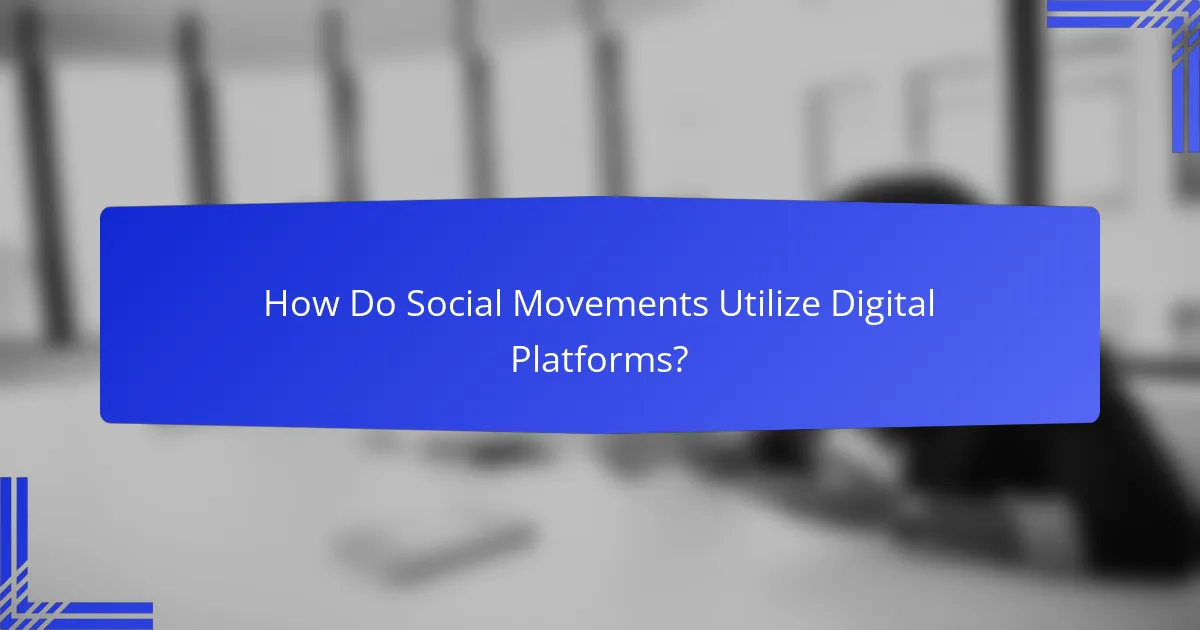
How Do Social Movements Utilize Digital Platforms?
Social movements leverage digital platforms to amplify their messages, mobilize supporters, and drive engagement. These platforms provide tools for outreach, fundraising, and community building, making them essential for modern activism.
Social media campaigns
Social media campaigns are a primary tool for social movements, allowing them to reach large audiences quickly. Platforms like Twitter, Facebook, and Instagram enable the sharing of compelling content, such as videos and infographics, which can go viral and raise awareness.
To create effective campaigns, movements should focus on clear messaging, engaging visuals, and timely hashtags. Regular interaction with followers can also foster a sense of community and encourage further participation.
Online petitions and fundraising
Online petitions serve as a powerful way for social movements to gather support and demonstrate public backing for their causes. Websites like Change.org allow users to create and share petitions easily, often leading to significant media attention.
Fundraising through platforms like GoFundMe or Kickstarter can help movements finance their activities. It’s crucial to set clear goals and communicate how funds will be used, as transparency builds trust and encourages donations.
Virtual events and webinars
Virtual events and webinars provide opportunities for social movements to educate and engage supporters without geographical limitations. These events can include discussions, workshops, or guest speakers, making them versatile tools for outreach.
To maximize participation, movements should promote events across various digital channels and consider time zones when scheduling. Offering recordings of the events can also help reach those who cannot attend live.
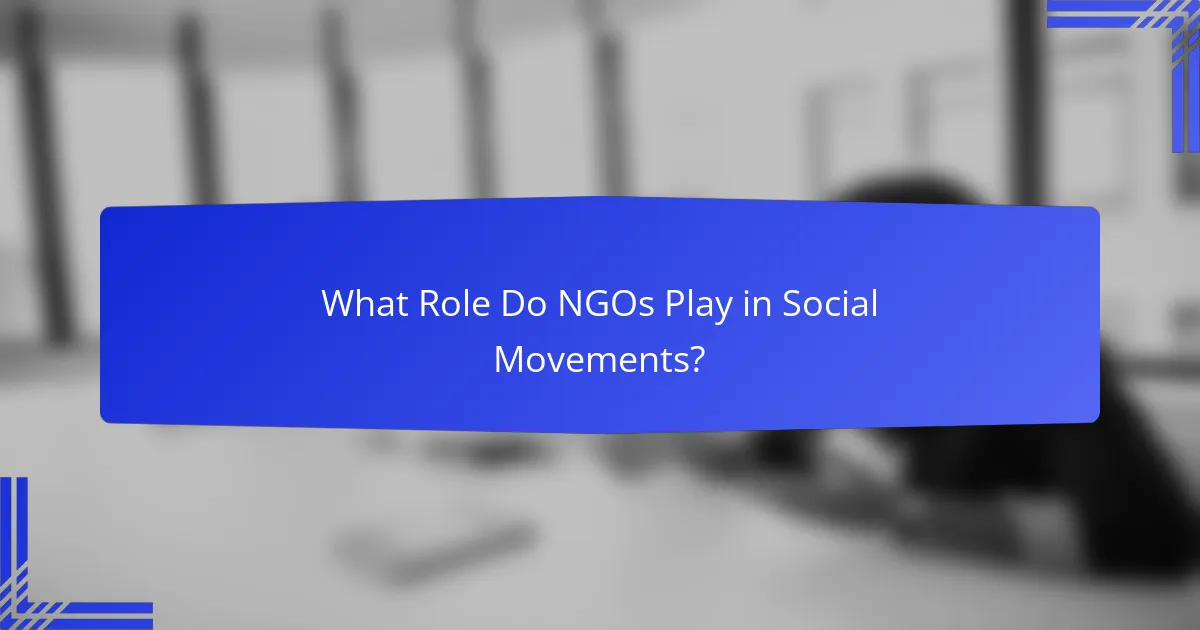
What Role Do NGOs Play in Social Movements?
Non-governmental organizations (NGOs) play a crucial role in social movements by providing advocacy, resources, and support to various causes. They often mobilize public opinion, influence policy, and facilitate grassroots organizing to drive social change.
Providing resources and support
NGOs offer essential resources and support to social movements, which can include funding, training, and logistical assistance. They often help grassroots organizations develop strategies, conduct research, and raise awareness about specific issues.
For example, an NGO focused on environmental issues might provide technical expertise to local activists, helping them understand regulations and best practices for sustainable development. This support can amplify the impact of local efforts and increase their chances of success.
Additionally, NGOs can connect social movements with broader networks, allowing for collaboration and sharing of best practices. This can enhance the effectiveness of campaigns and help movements gain visibility on national or international stages.
